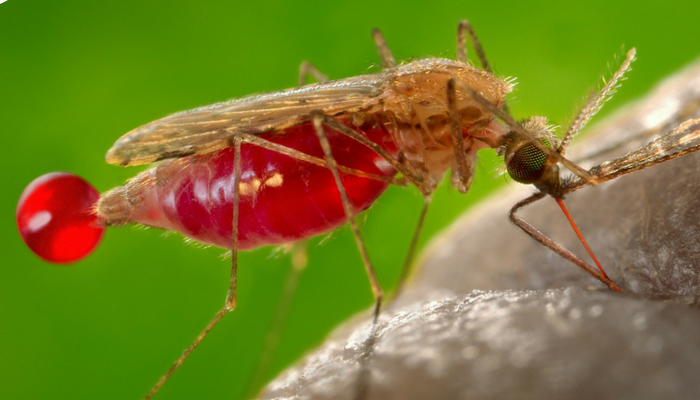Malaria is a life-threatening blood disease that is transmitted to humans through bites from infected mosquitoes. It is caused by the Plasmodium parasite, which is transmitted from person to person by the female Anopheles mosquito, the only mosquito that transmits malaria.
The female Anopheles mosquito primarily bites between the hours of 9pm and 5am. This is why sleeping under a mosquito net at night especially during these times is strongly recommended for prevention.
There are over 100 species of the malaria parasite, and the most deadly in Africa is known as Plasmodium falciparum. Once the parasite enters the human body, it will lodge itself in the liver where it will multiply roughly 10,000 times. The parasite bursts into the bloodstream where it will begin to infect red blood cells two weeks after entering the body.
Symptoms will occur ten days to 4 weeks after infection, although a person may start to feel ill as early as seven days. The most common symptoms of malaria include:
- severe to moderate shaking chills
- anemia
- high fever
- diarrhea
- nausea
- bloody stools
- profuse sweating
- headache
- vomiting
- muscle pain
- convulsions
- coma
Because Malaria is a life-threatening condition, treatment for the disease is typically provided in a hospital. A doctor will prescribe medications depending on the type of parasite that you have. Unfortunately, there are parasites that are resistant to drugs, making many drugs ineffective. When this happens, your doctor may need to use more than one medication or change medications altogether to treat your condition.
Malaria occurs mostly in poor, tropical and subtropical areas in the world. However, an estimated 3.4 billion people across 106 countries and territories are at risk of malaria which accounts for almost half of the world’s population.
Fortunately, malaria funding has increased significantly in the past few years resulting in a decline in new cases globally. This is thanks to the timely diagnosis and treatment using effective drugs and reliable diagnostic testing. Preventive measures such as indoor spraying with safe and long-lasting insecticides have also played a huge role in controlling the disease.
However, the costs of these interventions have become significant, and the current intervention tools and treatments are insufficient to keep up with the demand.
Can malaria be defeated?
We believe it can be. Malaria is preventable and treatable. Defeating it starts with educating yourself about the disease. History has shown that malaria has been eliminated before. If we mobilize now, our generation can defeat it again for good.
We at Vuliwear® believe that we can put an end to malaria. Nothing But Nets is an amazing organization that we look forward to have an opportunity to work with someday
Nothing But Nets is the world’s largest grassroots campaign to save lives by preventing malaria, a disease which claims the life of a child every two minutes. Inspired by sports columnist Rick Reilly, hundreds of thousands of people have joined the campaign that was created by the United Nations Foundation in 2006.
Nothing But Nets has raised over $60 million to help deliver ten million bed nets to families in need, along with other crucial malaria interventions. In addition to raising funds for its UN partners, Nothing But Nets raises awareness and voices to advocate for critical malaria funding for the U.S. President’s Malaria Initiative and The Global Fund to Fight AIDS, Tuberculosis and Malaria. It only costs $10 to help save lives from this deadly disease.
Visit www.NothingButNets.net to defeat malaria.

